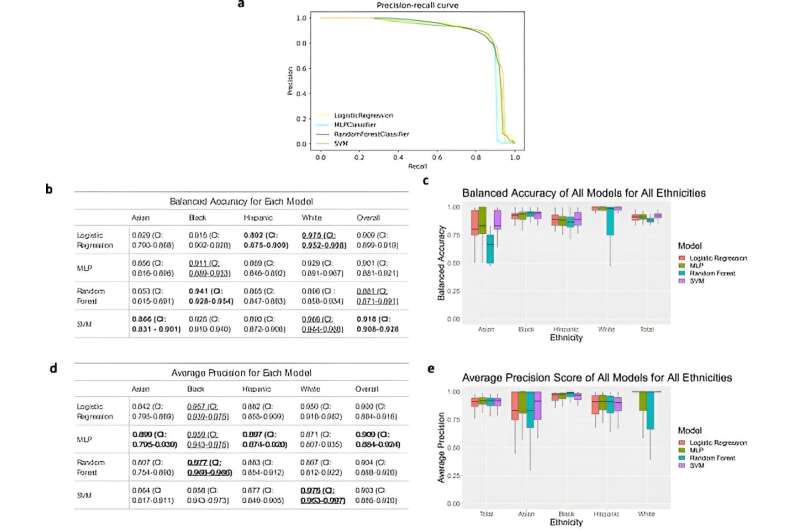This article has been reviewed according to Science X's editorial process and policies. Editors have highlighted the following attributes while ensuring the content's credibility:
fact-checked
peer-reviewed publication
trusted source
proofread
Study reveals bias in AI tools when diagnosing women's health issue

Machine learning algorithms designed to diagnose a common infection that affects women showed a diagnostic bias among ethnic groups, University of Florida researchers found.
While artificial intelligence tools offer great potential for improving health care delivery, practitioners and scientists warn of their risk for perpetuating racial inequities. Published in npj Digital Medicine, this is the first paper to evaluate fairness among these tools in connection to a women's health issue.
"Machine learning can be a great tool in medical diagnostics, but we found it can show bias toward different ethnic groups," said Ruogu Fang, an associate professor in the J. Crayton Pruitt Family Department of Biomedical Engineering and the study's author. "This is alarming for women's health, as there already are existing disparities that vary by ethnicity."
The researchers evaluated the fairness of machine learning in diagnosing bacterial vaginosis, or BV, a common condition affecting women of reproductive age, which has clear diagnostic differences among ethnic groups.
Fang and co-corresponding author Ivana Parker, both faculty members in the Herbert Wertheim College of Engineering, pulled data from 400 women, including 100 from each of the ethnic groups represented—white, Black, Asian, and Hispanic.
In investigating the ability of four machine learning models to predict BV in women with no symptoms, researchers say the accuracy varied among ethnicities. Hispanic women had the most false-positive diagnoses, and Asian women received the most false-negative.
"The models performed highest for white women and lowest for Asian women," said Parker, an assistant professor of bioengineering. "This tells us machine learning methods are not treating ethnic groups equally well."
Parker said that while they were interested in understanding how AI tools predict disease for specific ethnicities, their study also helps medical scientists understand the factors associated with bacteria in women of varying ethnic backgrounds, which can lead to improved treatments.
BV, one of the most common vaginal infections, can cause discomfort and pain and happens when natural bacteria levels are out of balance. While there are symptoms associated with BV, many people have no symptoms, making it difficult to diagnose.
It doesn't often cause complications, but in some cases, BV can increase the risk of sexually transmitted infections, miscarriage, and premature births.
The researchers said their findings demonstrate the need for improved methods for building the AI tools to mitigate health care bias.
More information: Cameron Celeste et al, Ethnic disparity in diagnosing asymptomatic bacterial vaginosis using machine learning, npj Digital Medicine (2023). DOI: 10.1038/s41746-023-00953-1





















